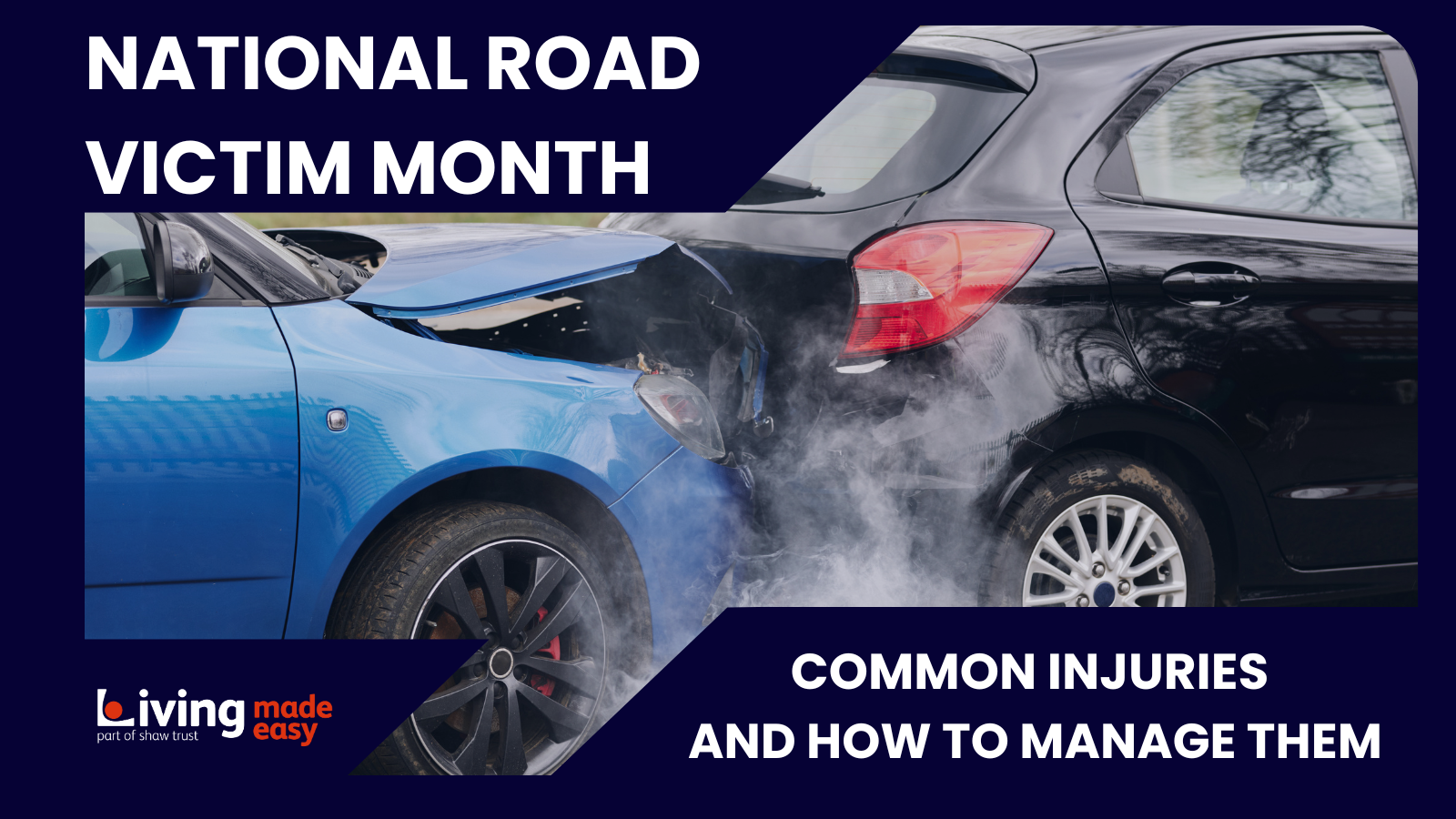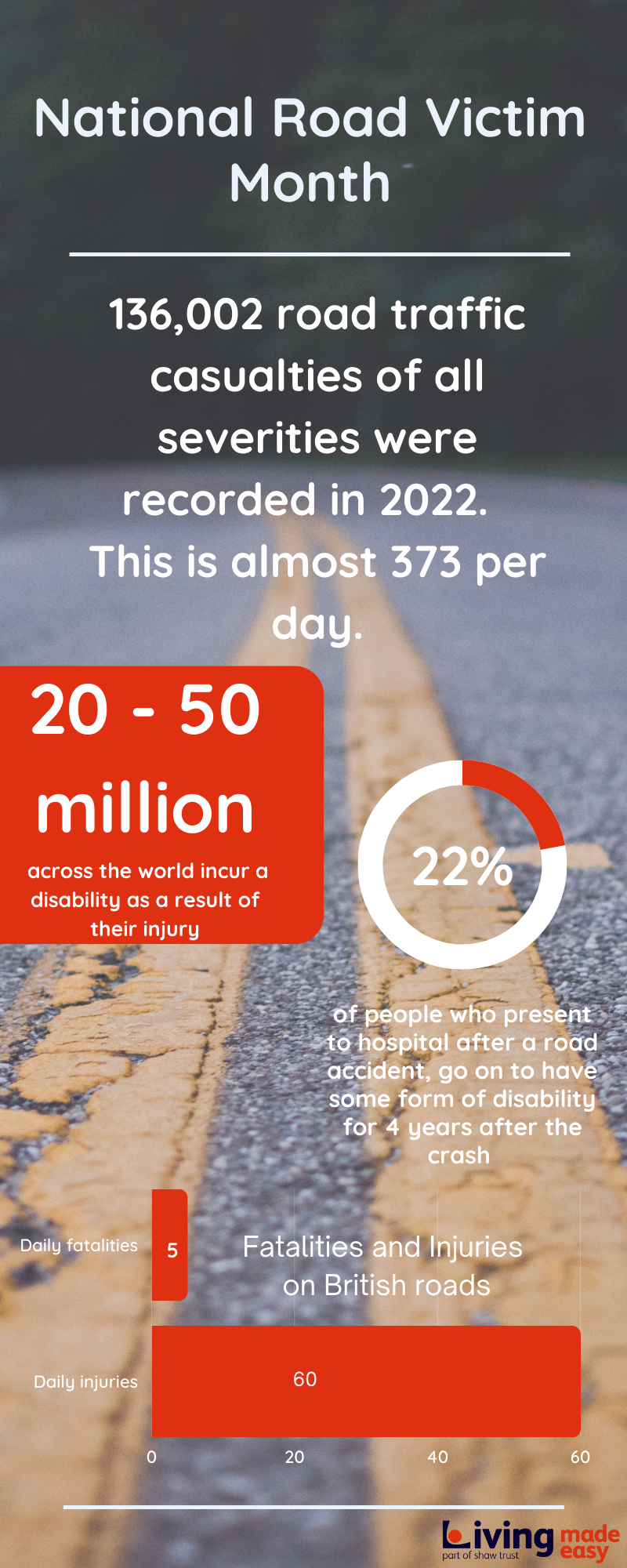National Road Victim Month: Common injuries and how to manage them

As August draws to a close, so too does National Road Victim Month. This awareness month exists both in remembrance for victims of road traffic accidents, and to raise awareness about road safety. According to government statistics, in 2022 136,002 road traffic casualties of all severities were recorded. This is almost 373 per day.
The charity RoadPeace set up National Road Victim Month, after the death of Princess Diana on the 31st of August 1997. RoadPeace are a charity who campaign for justice for victims and reduction in road danger. Today on Britain’s roads, 5 people are killed every day, and over 60 are seriously injured. These figures have stayed more or less the same for over a decade. By spreading awareness of road danger, RoadPeace hope to see a world where road danger is not tolerated, and road crash victims receive justice. The charity offer support to all those effected by road accidents, they have a helpline, support groups, advocacy and casework support, and compensation support for those who need it.

According to the World Health Organisation 20 – 50 million people across the world suffer non-fatal injuries by road accidents per year, with many incurring a disability as a result of their injury. National Road Victim Month is also a good opportunity to raise awareness for the lasting injuries and disabilities relating to road accidents. As road traffic accidents range in severity depending on the circumstances, so do injuries, therefore there are many disabilities which may come as a result of an accident.
In the most serious of cases, motor vehicle injuries can lead to disabilities which can sadly result in losing one’s independence, such as traumatic brain injury, paraplegia, quadriplegia and loss of eyesight. More common and less serious injuries such as whiplash or cervical spine injuries and injuries to ankles and knees, can result in chronic pain and impose limits on one’s usual level of activity. Road vehicle injuries can also lead to emotional trauma, for example after serious contusions, lacerations or burns. Statistics suggest that 22% of patients who present to hospital after a road accident with fractures to limbs, or a soft tissue injury such as whiplash, go on to have some form of disability for 4 years after the crash.
What are the most common injuries, and how can they be managed?
Cervical spine soft tissue injury (whiplash) – Whiplash happens as a result of when your head is suddenly jolted backwards and forwards, in a whip like movement. When this happens, the muscles and ligaments in your neck stretch, often resulting in pain, tenderness, or you may have a limited range of motion in your neck.
If you develop whiplash as a result of a road accident, you will likely be prescribed painkillers, but recovery could take up to 2- 3 months. There are other things that you can try to manage the pain. The NHS recommend heat or ice packs after a neck injury, and in the weeks that follow, the proper support for your neck can help to ease pain. Heated neck cushions are great for easing pain whilst offering support, some are battery operated and intended for use out and about. If you are uncomfortable whilst seated, or working, it may also be helpful to look for neck supports for your chair, you can find a range of neck and back rests on our website.
Spinal Injuries – Spinal injuries range in severity from slipped discs, to permanent nerve damage, which can result in paralysis. A slipped (or herniated) disc is when the soft, spongey tissue between the vertebrae in your spine, gets pushed out and inflamed, causing pain by pressing on the nerves. For a slipped disc, your GP may prescribe strong painkillers, a steroid injection, or a muscle relaxant to use in the short term. Cold therapy is often advised in the initial 48 hours after the injury to help with pain, as it alleviates muscle tension and reduces inflammation. However, after the initial 48 hours heat therapy might be more helpful, as heat can help to relieve painful muscle spasms. Heat therapy can be as simple as taking a warm bath, or using a heat pad or wrap. The use of heated back supports can also help to ease pain when seated. You can find lumbar supports and heated back supports on our website.
For the more serious of spinal injuries, you will be assessed by health care professionals and occupational therapists to assist you with the right equipment for your rehabilitation.
Mobility Impairments – Trauma to the limbs during road accidents can cause lasting mobility problems, from walking to manipulating objects by hand. Wheelchairs and walking aids such as walking sticks or canes, can be helpful if you experience mobility issues when out and about. If you are experiencing issues with manipulating objects, then there is a range of equipment which might be helpful such as adaptive cutlery, kettle tippers to eliminate the need for lifting when pouring and many other household adaptations which you can find listed on our website.
Psychological Trauma – No matter whether a physical injury resulted from a road traffic accident or not, they often lead to psychological trauma. This can include anxiety, depression and PTSD, and it’s important to seek help and speak to your GP if you feel your mental wellbeing has suffered as a result of the accident. Charities such as RoadPeace also offer support and have support groups dedicated to road accident victims.
.png)
We hope you have found this article helpful and informative. If you wish to find out any more about the types of products mentioned in this article please click on the bold and underlined text, or take a look at some of the product categories listed below.
- Back and neck supports for chairs
- Manual Wheelchairs
- Walking sticks and canes
- Cutlery
- Kettles and drinks dispensers
- Household adaptations
If you are looking for more support and advice on road victim awareness and road traffic accidents, then please take a look at the links below.
- RoadPeace
- Disability World
- European Commission - Road Safety
- The World Health Organisation
- Gov.uk – Road accidents and safety statistics
- NHS inform
- Spine Health
- Plymouth Bay Orthopedic
All advice included in this article is taken from the sources listed and has not been written by a clinician. You should always consult medical professionals after being involved in any kind of road accident.